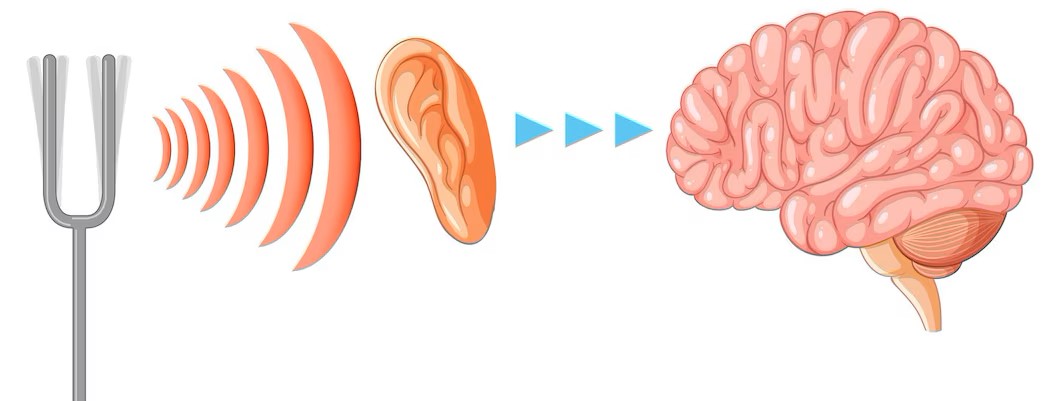How does hearing loss impact brain aging?
Do you or someone you know have hearing loss? Age-related hearing loss (also termed presbycusis) occurs as the result of a natural deterioration of the inner ear and nerves due to advancing age.
Age-related hearing loss tends to impact high pitch sounds the most, such as birds chirping and sirens wailing, but hearing loss can progressively worsen to also impact speech sounds. Hearing loss is quite prevalent – affecting up to two thirds of older adults over the age of 70 years old, and it is more common in males than females.
So, why do we care about hearing loss in a memory and attention clinic? Because hearing loss has recently been identified as the potentially largest modifiable risk factor for dementia! In our last blog post, we discussed several ways to optimize brain aging - like being physically active, keeping your brain intellectually stimulated, and spending time with family and friends. However, it would be remiss to talk about optimal brain aging without mentioning the impact of hearing loss.
So, how exactly does hearing loss impact our thinking skills? One theory is that when hearing is reduced, the brain receives less input from sounds in the environment. This can lead to something called brain atrophy (or a loss of brain cells) in the area of the brain that typically picks up sound signals (i.e., the temporal lobes). The amazing thing about our brain is that it’s flexible, even as we get older. Our brains can recruit and activate other brain regions, like the frontal lobes, to help make sense of the noise signal. However, this may come at a cost. Our frontal lobes are important for managing many different thinking skills. Whether it be planning, keeping organized, multi-tasking, problem-solving, following multi-step directions, or keeping our focus, our frontal lobes are hard at work. So, the problem is, if our frontal lobes are being recruited to help with listening and making sense of what someone is saying, this draws on the same set of resources, and can then impact the other skills the frontal lobes are responsible for.
A real-life example would be the following: Jim (who has hearing loss) is going on a walk with his wife, Susan. As they’re walking, Susan notices that every time they are engaged in a conversation, Jim is trailing behind. He is taking shorter steps and is walking more slowly. Why does this happen? Because walking and talking requires multi-tasking! When Jim needs to listen, his brain recruits his frontal lobes to pick up the work that would normally be done by his temporal lobes. This takes away resources for other things, like multi-tasking, leading him to walk more slowly or stop walking all-together.
Another theory for how hearing loss can impact our thinking abilities is that hearing loss makes listening more effortful and tiring. Even if you don’t have hearing loss, you’ve probably experienced a time when you’ve been trying to converse with someone in a busy environment, such as a restaurant or a party, and have found it extremely effortful to listen to what the other person is saying. Another analogy is in the context of learning another language. If you’re practicing a new language, it might be relatively easy to speak with someone when its one-on-one, but when there’s a whole group of people speaking at once, it can be more effortful to keep up with the conversation. When someone has hearing loss, the experience is similar. Social activities can become exhausting and less pleasurable, often leading individuals with hearing loss to withdraw from social activities all together. So, why might this not be optimal? Well, when we isolate ourselves, we have less opportunity to activate or stimulate our brains. Keeping up with a conversation and trying to think of what we might add uses a lot of mental effort. Just like regular physical exercise is important, keeping our brain active through intellectually stimulating activities and social engagement is also key to optimal aging. We also know that when we withdraw from social activities, it can impact our mood, causing us to feel more sad, lonely, and depressed.
So, what can we do about this?
If you have hearing loss, while it can be challenging to follow conversations in noisy environments or large crowds of people, it’s important to try to connect with others, even if this looks a little different. For example, spending time with friends and family in a one-on-one setting. If you haven’t had your hearing assessed yet, it’s important to bring this up with your family doctor and to have regular hearing assessments to see if you may need hearing aids. If you’ve had your hearing assessed, and you require hearing aids, it is strongly recommended to wear them! Unfortunately, hearing aids aren’t a perfect fix for hearing, like glasses are for vision, but with time, you should be able to adjust to them. Research also shows that wearing hearing aids can reduce risk of cognitive decline.
The bottom line is that hearing loss is quite common as we get older, and it is associated with an increased risk for cognitive decline and dementia. Keeping your brain active through intellectually stimulating activities and social engagement is important for maintaining brain health. Have your hearing assessed regularly and consistently wear your hearing aids should you require them as another way to optimize brain aging!
Blog post by Rachel Downey, PhD candidate. Currently accepting new clients. Book with her here.

